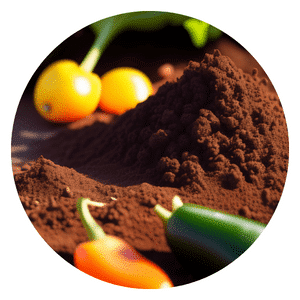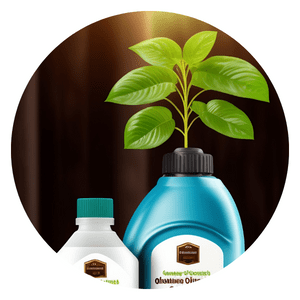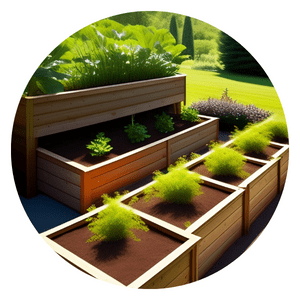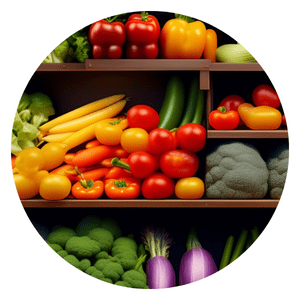What Is The Best Organic Vegetable Garden Fertilizer?
Are you tired of spending money on expensive fertilizers for your organic vegetable garden? Well, look no further because we have the answer to all your gardening woes.
In this article, we will explore the world of organic vegetable garden fertilizers and help you find the best one for your plants.
Whether you are a seasoned gardener or just starting out, understanding the importance of choosing the right fertilizer is crucial for a successful harvest.
So sit back, grab a cup of tea, and get ready to discover the secrets behind growing healthy and delicious vegetables in your own backyard.

Organic Fertilizer Menu
Compost
Compost is like a magical elixir for your organic vegetable garden. Whether you make it at home or purchase it, compost is a treasure trove of benefits.
Not only does it provide essential nutrients to your plants, but it also improves soil structure and enhances water retention.
Homemade compost can be made from kitchen scraps, yard waste, and other organic materials, allowing you to fully control the quality and composition.
On the other hand, purchased compost may offer convenience and consistency if you don’t have the time or resources to create your own.
One advantage of homemade compost is that you have complete control over what goes into it. By using only organic materials that are free from pesticides and chemicals, you ensure that your plants receive pure nourishment.
Additionally, making your own compost saves money in the long run since you’re utilizing waste products that would otherwise end up in the landfill. However, creating homemade compost requires time and effort for proper maintenance and decomposition.
On the flip side, purchased compost offers efficiency and convenience without requiring any manual labor on your part.
It comes pre-packaged with a consistent blend of organic matter and essential nutrients needed for healthy plant growth. This option can be particularly beneficial for beginners or those with limited space for composting at home.
Nonetheless, buying compost means relying on external sources which may not align with your preferences regarding sustainability or eco-friendliness.
Well-Rotted Manure
Well-rotted manure is a hidden gem in the world of organic vegetable gardening. This age-old practice of using animal waste as a natural fertilizer has been proven to enhance soil fertility and produce healthy, vibrant crops.
However, it’s important to use aged and well-rotted manure to avoid any potential issues.
The process of composting the manure not only eliminates odors but also helps break down nutrients into forms that plants can readily absorb.
One major advantage of using well-rotted manure is its ability to improve soil structure.
As the manure breaks down, it adds valuable organic matter to the soil, which improves its water-holding capacity and drainage properties. This means that your plants will have access to both vital moisture during dry periods and oxygen for their roots to thrive.
Additionally, the slow release of nutrients from the decomposing organic matter ensures a steady supply throughout the growing season.
Furthermore, when sourced from reputable farms or suppliers, well-rotted manure can be an excellent source of beneficial microorganisms that promote healthy plant growth. These microscopic organisms play crucial roles in breaking down organic matter further, releasing additional nutrients while suppressing harmful pathogens.
By incorporating well-rotted manure into your garden beds or containers, you’re effectively creating a diverse ecosystem within your soil that supports robust plant growth and overall soil health.
Fish Emulsion
Fish emulsion is a secret weapon for organic vegetable gardeners. Derived from fish waste, this liquid organic fertilizer is a powerful source of nutrients, including nitrogen.
What sets fish emulsion apart from other fertilizers is its quick-acting nature, allowing plants to absorb the much-needed nutrients almost instantly.
By diluting it with water and applying it directly to the soil or even as a foliar spray, you can provide your vegetables with an immediate boost that will help them thrive.
Aside from being highly effective, fish emulsion offers additional benefits for your organic garden.
It not only promotes healthy plant growth but also improves the overall quality of the soil by increasing microbial activity and promoting beneficial bacteria and fungi. This enhanced soil health leads to better nutrient absorption by plants and creates an environment that discourages pests and diseases.
In addition to its nutrient-rich nature, fish emulsion is environmentally friendly as well. By utilizing waste from the fishing industry, it helps reduce waste streams while simultaneously providing a sustainable source of nutrients for your plants.
So not only are you nourishing your vegetables with high-quality fertilizer but also contributing towards a more eco-conscious approach in gardening.
In the garden's fertile embrace, Thrive treasures of life, verdant and chaste. With every seed in earth's bosom sown, A secret whispered, nature's wisdom shown. For the soul of nourishment, we seek, In fair harmony, to enrich and tweak. Compost, a gift from decay's gentle art, The best organic fertilizer for a flourishing start.
Chappy The Gardener
Bone Meal
Bone meal is a powerhouse when it comes to providing essential nutrients for plant growth.
Its high phosphorus content makes it an ideal fertilizer for promoting healthy root development and vigorous flowering in plants. This is especially beneficial for root crops like carrots and beets, as they rely heavily on strong root systems to absorb nutrients from the soil.
However, bone meal isn’t only limited to root crops; it can benefit a wide range of vegetable plants too.
For instance, tomatoes and peppers also greatly benefit from an adequate supply of phosphorus during their early stages of growth.
By using bone meal as a natural fertilizer, you can give these plants a head start in establishing well-developed roots, which sets the stage for robust growth and bountiful harvests later on.
In addition to its phosphorus content, bone meal offers another advantage that helps enrich the soil: slow release of nutrients.
Unlike synthetic fertilizers that can quickly leach out of the soil or cause nutrient imbalances, bone meal gradually releases its nutrients over time. This ensures a steady supply of phosphorus to your plants throughout their growing season, promoting sustained growth without overwhelming them.
Moreover, this slow release characteristic prevents water pollution by reducing runoff into nearby waterways – making it an eco-friendly choice for gardeners who care about the environment.
Blood Meal
Blood meal is a secret weapon that every organic gardener should have in their arsenal. This powerful fertilizer is derived from dried and ground animal blood, making it an all-natural source of nitrogen for your plants.
And when it comes to leafy greens and other nitrogen-hungry vegetables, blood meal is the superhero they’ve been waiting for.
One of the key benefits of using blood meal as a fertilizer is its high nitrogen content.
Nitrogen is vital for plant growth, as it plays a crucial role in chlorophyll production, which gives plants their vibrant green color.
Leafy greens like spinach, lettuce, and kale require an ample supply of nitrogen to thrive and produce abundant harvests. By adding blood meal to the soil around these plants, you’re providing them with the essential nutrient they crave.
But blood meal isn’t just any old source of nitrogen; it’s quick-acting and readily available to plants.
Unlike slow-release fertilizers that take time to break down and release nutrients into the soil, blood meal goes straight to work almost immediately after being applied. This means that your leafy greens will start benefiting from its nutrient boost right away, resulting in lusher foliage and faster growth.
Incorporating blood meal into your organic vegetable garden not only ensures healthier plants but also contributes to sustainable gardening practices by making use of natural waste products like animal by-products.
So next time you’re looking for a potent organic fertilizer for your leafy greens or other nitrogen-hungry vegetables, don
Alfalfa Meal
Alfalfa meal may not be on the top of everyone’s list when it comes to organic fertilizers, but its benefits are hard to ignore. This slow-release fertilizer is made from dried alfalfa plant, which is rich in nitrogen, phosphorus, and potassium.
However, what sets alfalfa meal apart from other organic fertilizers is its ability to improve soil structure.
The high content of organic matter in alfalfa meal helps to break up clay soils and enhance water retention in sandy soils. This means that your vegetable garden will have better drainage and aeration, creating optimal conditions for healthy root development.
Additionally, the slow-release nature of alfalfa meal ensures a steady supply of nutrients over an extended period of time, reducing the risk of nutrient leaching and providing sustained nourishment for your plants.
Moreover, alfalfa contains a range of essential trace minerals like magnesium, iron, and zinc that can benefit your vegetable garden immensely. These micronutrients play vital roles in various plant functions such as photosynthesis and enzyme activation.
By incorporating alfalfa meal into your soil regimen, you can provide your vegetables with all the necessary nutrients they need for robust growth while ensuring long-term soil health.
Seaweed and Kelp Meal
Seaweed and kelp meal may not be the first things that come to mind when you think of organic vegetable garden fertilizers, but they are certainly worth considering. These natural amendments are packed with a wide array of nutrients and trace minerals that can give your plants the boost they need for optimal growth.
From nitrogen and phosphorus to calcium and magnesium, seaweeds contain all the essentials for healthy plant development.
But it’s not just about providing nutrients; seaweed and kelp meal also have unique properties that can improve soil health. Their high organic matter content helps build soil structure, improving water retention and drainage. This means healthier root systems, better nutrient uptake, and ultimately more robust plants.
Additionally, seaweeds contain natural growth regulators that stimulate root growth and enhance overall plant vigor.
Furthermore, one of the key benefits of seaweed and kelp meal is their ability to enhance a plant’s resistance to stress factors such as drought or disease.
These organic amendments contain cytokinins — compounds that help regulate cell division — which can strengthen a plant’s immune system to ward off pests and diseases more effectively.
Worm Castings
Worm castings may just be the secret ingredient your organic vegetable garden needs to thrive.
Not only are they rich in essential nutrients like nitrogen, phosphorus, and potassium, but they also contain a plethora of beneficial microorganisms that enhance soil health. These tiny creatures work tirelessly to break down organic matter, making it more accessible to plants’ root systems.
By incorporating worm castings into your garden bed or potting mix, you’re giving your plants a nutritious boost that will promote robust growth and increase their resilience against pests and diseases.
But the benefits of worm castings go beyond mere plant nutrition. The microorganisms present in these humble pellets play a crucial role in maintaining soil structure and fertility.
They help create aggregates – clusters of soil particles – that provide essential pore space for air and water movement. This enhanced porosity not only improves drainage but also allows roots to penetrate deep into the soil and access water more efficiently.
Additionally, by promoting beneficial microbial activity, worm castings can suppress harmful pathogens that can negatively impact plant health.
By harnessing the power of nature’s hardworking earthworms, you can unlock the potential of worm castings as an organic vegetable garden fertilizer like no other. Their nutrient-rich composition combined with their ability to promote healthy soil biology make them an invaluable addition to any gardening regime.
Give your veggies an extra boost this season by incorporating vermicompost into your planting routine – your plants will thank you with bountiful harvests bursting with flavor!
Green Manure Cover Crops
Green Manure Cover Crops are an excellent way to improve soil fertility in your organic vegetable garden.
By planting cover crops like clover or legumes during the offseason, you can add valuable organic matter to the soil when they are turned under. This process not only helps increase nutrient levels, but it also improves soil structure and water retention.
One major benefit of using green manure cover crops is their ability to fix nitrogen in the soil.
Legumes in particular have symbiotic relationships with nitrogen-fixing bacteria on their roots. These bacteria convert atmospheric nitrogen into a usable form that plants can absorb, effectively fertilizing the soil naturally.
By incorporating legumes like alfalfa or red clover into your garden rotation, you can reduce or even eliminate the need for synthetic nitrogen fertilizers.
Another advantage of green manure cover crops is their role in weed suppression.
When cover crops are grown densely, they shade out weeds and prevent them from germinating and growing. This means less time spent weeding and more time enjoying your garden!
Additionally, as these crops decompose, they release organic acids that inhibit weed seed germination and growth even further.
In conclusion, utilizing green manure cover crops is an effective strategy for improving soil fertility in your organic vegetable garden.
By adding valuable organic matter through their incorporation into the soil, these cover crops contribute essential nutrients while also enhancing water retention and weed suppression capabilities.
With environmental concerns on the rise and a growing interest in sustainable gardening practices, it’s clear that planting green
Organic Fertilizer Blends
Commercial organic fertilizer blends are a convenient option for those looking to provide their vegetable garden with a balanced nutrient profile. These blends combine various organic materials, such as composted manure, bone meal, and fish emulsion, to create a potent blend of nutrients that promote healthy plant growth.
One advantage of using commercial organic fertilizer blends is that they come pre-portioned for optimal nutrient balance, ensuring that your plants receive everything they need in the right amounts.
When choosing a commercial organic fertilizer blend, it’s important to look for products with a balanced N-P-K ratio.
The N-P-K ratio represents the percentage by weight of nitrogen (N), phosphorus (P), and potassium (K) in the fertilizer. A balanced N-P-K ratio ensures that your plants receive an even distribution of nutrients necessary for all stages of growth.
For instance, a ratio of 10-10-10 would contain equal parts nitrogen, phosphorus, and potassium.
It’s worth noting that not all vegetables require the same nutrient ratios to thrive.
Some vegetables may benefit from higher levels of specific nutrients at different growth stages or based on their specific needs.
Therefore, it’s essential to research the recommended nutrient requirements for each type of vegetable you plan to grow before selecting an organic fertilizer blend.
Epsom Salt (Magnesium Sulfate)
Epsom salt, also known as magnesium sulfate, is not only a great addition to your relaxation routine but can also be an excellent organic fertilizer for your vegetable garden.
Adding Epsom salt to your soil can provide much-needed nutrients like magnesium and sulfur, which are essential for healthy plant growth.
While many vegetables can benefit from this mineral-rich supplement, tomatoes and peppers especially thrive when Epsom salt is added to the soil.
Magnesium plays a crucial role in chlorophyll production within plants, contributing to their overall energy production and growth. By using Epsom salt in the garden, you can ensure that your tomato plants develop strong roots and stems while producing vibrant green leaves.
Pepper plants will also appreciate the boost of magnesium provided by this natural fertilizer, resulting in improved fruit yield and quality.
In addition to promoting healthy growth in tomatoes and peppers, Epsom salt has the additional benefit of deterring pests.
Snails and slugs are known to dislike crossing paths with this mineral compound.
By incorporating Epsom salt into your vegetable garden, you may effectively reduce pest damage without resorting to harmful chemical pesticides.
With its multi-purpose uses ranging from providing essential minerals to improving pest control capabilities, Epsom salt proves itself a valuable resource for any organic gardener seeking optimal yields from their tomato and pepper plants.
So next time you’re in need of an organic boost for your veggie patch, consider adding some magnesium sulfate into the mix – both you and your plants will reap the
Homemade Organic Tea
One of the easiest and most effective ways to fertilize your organic vegetable garden is by making homemade organic tea from compost or well-rotted manure. This nutrient-rich liquid acts as a natural fertilizer that provides essential nutrients to your plants.
Not only does it nourish the soil, but it also improves its structure and promotes healthy plant growth.
Steeping compost or manure in water allows for the release of beneficial microorganisms and nutrients into the liquid. These microorganisms help break down the organic matter even further, creating a potent brew that is easily absorbed by plants’ roots.
By using homemade organic tea as a fertilizer, you are introducing a balanced blend of nutrients directly into the soil, ensuring that your vegetables receive everything they need to thrive.
Another advantage of using homemade organic tea is its cost-effectiveness.
Instead of buying expensive commercial fertilizers, you can utilize materials readily available in your garden or kitchen scraps to produce an equally if not more effective solution.
Plus, there’s something satisfying about knowing exactly what goes into your garden and taking control of its nourishment naturally.
By incorporating homemade organic tea into your gardening routine, you are giving your plants a boost without relying on chemical-based products. It’s an eco-friendly method that promotes sustainability while providing long-term benefits for both your crops and the environment.
So why not give it a try? Start brewing up some homemade organic tea today and see firsthand how this simple yet powerful technique can transform your vegetable garden into a thriving oasis.
In conclusion, there are several effective organic fertilizers available for vegetable gardens.
The best choice depends on various factors such as the specific needs of the plants, soil conditions, and personal preferences.
Some popular options include compost, manure, bone meal, and seaweed-based fertilizers. It is important to choose a fertilizer that is certified organic and free from synthetic chemicals or additives.
Ultimately, the best organic vegetable garden fertilizer is one that promotes healthy plant growth while minimizing environmental impacts.
So, take some time to research and experiment with different fertilizers to find the best fit for your garden. Happy gardening!
Click To Grow
Helps Us Grow – Share If You Like















